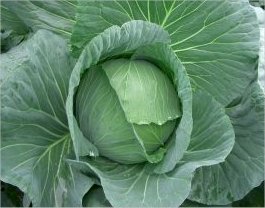General Articles
Amuse-Bouche No. 11

My Little Cabbage
by Julia Frey
If you learn only one word in French, make it chou.
Sunday night, coming back from the country, everyone’s starving.
Philippe: “Venez donc chez nous, manger à la fortune du pot (Come to our house and eat potluck). Nous avons de la soupe aux choux (cabbage soup).”
Bénédicte, our local food expert, steps in: “For centuries, la soupe aux choux (plural, because it could contain several kinds of cabbage) was staple peasant fare in France. If you were lucky, you had a little gras (fat ham or bacon) to put in it.”
Isabelle, banging on the table: “Vouiii ! (Yesss!) De la soupe ! J’ai une faim de loup (I’m hungry as a wolf) !”
François-Noël, our local Christmas expert, intones a children’s carol:
“Melchior et Balthazar
et le roi Gaspar,
affamés comme des loups...
Ils mangèrent de la soupe, de la bonne soupe aux choux.’’
Even the three wise men, when famished, ate cabbage soup! While the soup heats, we sip an apéritif and ruminate on l’humble chou with its multiple, contradictory, metaphoric meanings.
Béné: “When mes parents married, on the morning after, they were served une soupe aux choux, aide traditionelle à la conception. It must work. I’m their fifth enfant à naître dans un chou (cabbage patch kid). I know in the US, la cigogne (the stork) brings you. But in France, it drops you into a cabbage. Actually, to be precise, it only delivers les garçons (boys) in a cabbage. It serves up les filles in a rosebud.”
Phil: “Béné, mon chou (cream-puff, i.e., sweetie-pie), is that why your father called you un adorable petit bout de chou (little tiny cabbage) ?”
Isa surenchère (ups the ante, puts in her two cents’ worth): “Ben, you were si chou (so cute) wearing choux (puffy ribbon bows) on the ends of your pigtails. No wonder you were la chouchoute (favorite) de Papa.
Ben: “Maman was too fatiguée to chouchouter (spoil) anyone.”
François-Noël: “Voila des expressions hypocoristiques ! ”
Moi: “Aha! Linguistic one-upmanship!” I get out the Dictionnaire Grand Robert, volume H, and summarize. “Hypocoristique: this obscure adjective describes a kind of affectionate “baby-talk” by adults: using diminutives, or doubling syllables, as in “chouchou”.
Flip (or is that Phlip?): “Chouette alors ! ”
Moi: “Attends ! (wait a minute!) Chouette is not the diminutive of chou. Une chouette is a screech owl!”
F-N: “But chouette and chou can be used the same way: t’es chou/chouette (nice, charming, sympa’, délicieux, chic). The poet Rabelais invented the compliment ‘jolie comme une belle petite chouette.’ ”
Moi: “Pretty as a beautiful little screech owl? Well, I guess a crying baby is comparable to a screech owl.”
The game is on. We dig up expressions with chou.
Béné (inventing a “Dupont” joke): “I hear Dupont was envoyé planter ses choux (fired.) Too bad. He expected to stay until he was ready to aller planter ses choux (retire).”
Planter ses choux means retourner à ses affaires privées. The difference is between envoyer (to send off, in this case from his position) and aller (to go willingly). La vie n’est pas toujours un lit de roses (life can be a bed of cabbages).
Moi (riposte):“Well, at least they didn’t lui rentrer dans le chou (physically attack him).”
Here chou (singular) refers to a rounded, kickable body part -- head or derrière.
Ben: “But he was still dans les choux (in a bad place) !”
The original expression, “finir dans les choux,” comes from horse racing. Early racetracks were grassy ovals, surrounded by farmers’ fields. If a horse ran off the track, it could end up literally in the cabbages. There are some wonderful idiomatic synonyms for dans les choux, meaning messed up, out of it, mentally disoriented: hors course (off track, out of the race), à côté de ses pompes, de ses baskets (literally: beside his pumps, his hi-tops; implicit: he’s so off track he’s walking alongside his shoes).
Isa: “Now Dupont writes for une feuille de chou (a cabbage leaf -- a tabloid).”
Béné: “Wait! I’m running out of material.” She gets volume C of the Grand Robert. “OK, voilà l’histoire ! Dupont avait fait chou blanc (had failed) in banking. When they offered him a journalism job, he thought: Ils me prennent le chou (they’re playing head games with me, wasting my time). Je m’y entends comme à ramer des choux (I know as much about journalism as I know about staking cabbages)."
Isa: “You stake tomates, not cabbages! Notre grand’mère, la vieille chouette (old hag) would call you bête comme chou (stupid as a cabbage)!”
Bénédicte: “Chut ! (Shh!) It’s my story. So how could he ménager la chèvre et le chou ? He asked for a trial run on the rag, and discovered it’s bête comme chou. Now Dupont fait ses choux gras dans la presse à sensation.”
Moi (overwhelmed): "Quoi ?"
Bénédicte (patiently): “Voilà. To reconcile both goat and cabbage means to maintain two contradictory options, be streetwise, play it cool. The English parallel is ‘run with the hare and hunt with the hounds.’ An idiotic person is bête comme chou, but a thing that’s bête comme chou is easy as pie. Faire ses choux gras means to put fat in one’s cabbage, to make a quick buck. But le chou-gras (lamb’s quarters, chenopodium) is not a cabbage at all. It’s a spinach-like weed, mostly eaten by the very poor. Take the expression, jeter ses choux-gras, to be a spendthrift. Only a rich person would toss les choux-gras. The poor would eat them. Oh, yeah, and la presse à sensation means yellow journalism.”
François-Noël, slurring his voice: “Un chou est un chou.”
He’s corrupting "un sou est un sou" (a penny is a penny) an expression attributed to Auvergnats, who like my Scottish ancestors, have a reputation for penny pinching.
Isa: “This is making me even hungrier! Where’s la soupe!
Phil: “Soup’s on! ( À table ! )”
Isabelle: (holding out her bowl): “Juste un soupçon (just a suspicion, a hint, i.e. a little bit).”
Philippe (ladle in hand): “Juste un chouïa (from North African Arabic: un peu) ? ”
© Julia Frey 2011
(julia.frey@aya.yale.edu)



